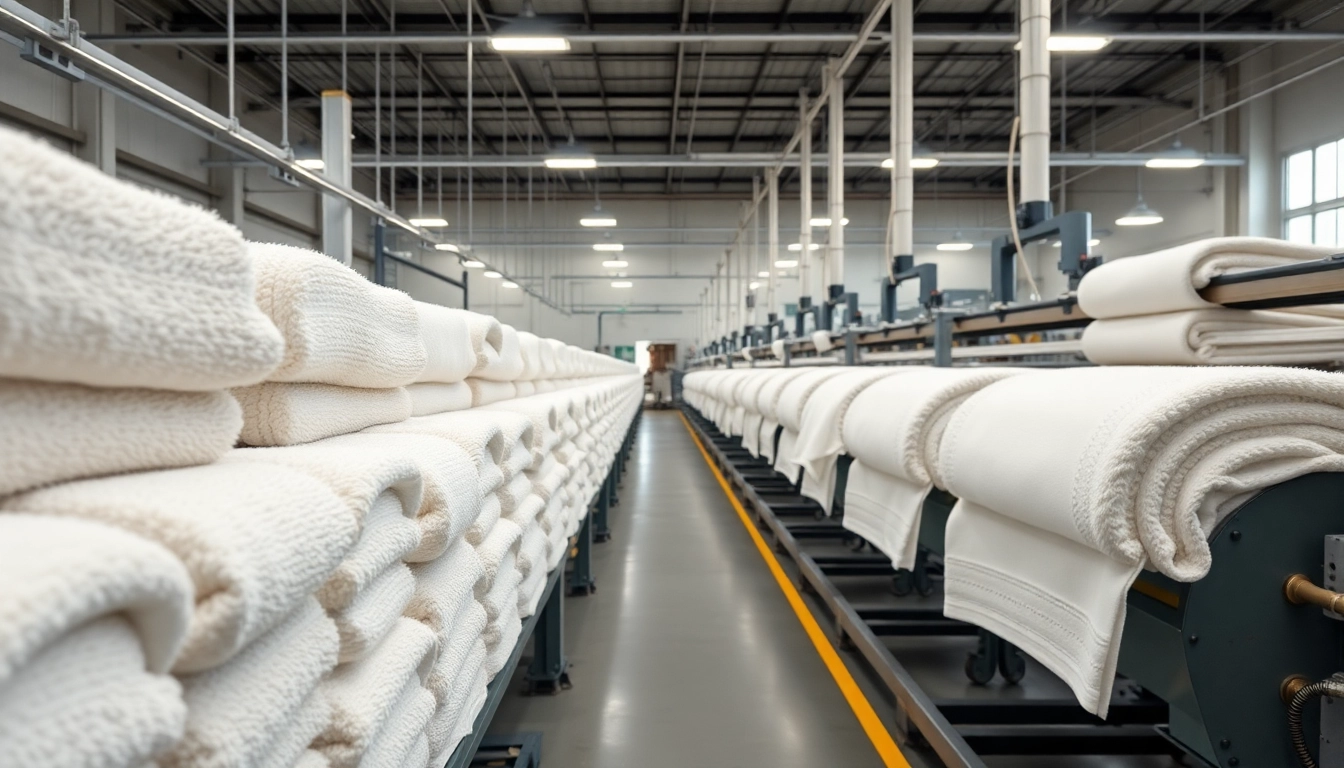Understanding the Towels Manufacturing Industry in the USA
The towels manufacturing industry in the United States stands as a pillar of the textile sector, combining tradition with innovation to meet diverse consumer and business demands. As one of the largest markets globally, the USA offers a fertile ground for both established brands and emerging manufacturers. For businesses looking to source high-quality, sustainable, and customizable towels, understanding industry trends, key players, and standards is essential. This knowledge ensures strategic decisions that align with quality, compliance, and market positioning, making it indispensable to partner with a reputable Towels manufacturer in USA.
Market Overview and Industry Trends
The US towel manufacturing industry encompasses a wide spectrum—from luxury spa towels to functional beach and gym towels. Over recent years, trends such as sustainability, eco-friendliness, and innovative textiles have reshaped the landscape. Consumers are increasingly seeking products made from organic or recycled materials, prompting manufacturers to adopt environmentally responsible practices and certifications like OEKO-TEX and GOTS.
Technological advancements have also played a role in elevating product quality and production efficiency. Automated knitting, dyeing, and finishing processes have minimized waste and enhanced consistency. Additionally, the surge in e-commerce and private-label brands has created a demand for customized towels on a large scale, requiring manufacturers to offer flexible design and branding options.
The market’s growth is supported by the hospitality, healthcare, and retail sectors. For example, luxury hotel chains prefer high-end, plush towels with branding details, while the healthcare industry demands durable, absorbent towels that meet strict hygiene standards. This diversification necessitates manufacturers to adapt their offerings to particular industry specifications and standards.
Key Players and Competitive Landscape
The USA hosts several prominent towel manufacturers renowned for their quality and innovation. Leading companies such as Oasis Towels, USATowel, and Leading Towel Company in the USA exemplify the industry’s diversity. Each offers a unique value proposition, from luxury custom towels to mass-market products.
Oasis Towels, for instance, specializes in wholesale manufacturing with a broad product range including beach, bath, and cooling towels, emphasizing quality and customization. USATowel prides itself on providing American-made products that meet consumer demands for durability and affordability. The competitive landscape is also characterized by smaller, boutique manufacturers focusing on niche markets like eco-friendly or luxury towels.
Market entry and growth are influenced by factors such as capacity, innovation, certification compliance, and pricing strategies. Emerging manufacturers leverage online channels and private-label partnerships to carve out niches, enhancing overall industry competitiveness.
Regulatory Standards and Certifications
Compliance with industry standards and certification requirements is critical for manufacturers operating in the US. Certifications such as OEKO-TEX Standard 100, GOTS (Global Organic Textile Standard), and NSF International assure product safety, environmental responsibility, and quality. These standards not only enhance brand trust but also facilitate entry into international markets.
Manufacturers must adhere to regulations related to chemical use, dye safety, and fair labor practices. The Federal Trade Commission (FTC) also enforces truthful labeling concerning fiber content and manufacturing origins. Ensuring these certifications and standards are met requires rigorous quality assurance programs and regular audits.
Investing in certification acquisition can be a significant competitive advantage, especially for brands aiming to position themselves as sustainable or premium providers.
How to Choose the Right Towels Manufacturer in USA
Quality Assurance and Material Sourcing
High-quality towels start with premium raw materials. Cotton, especially Egyptian or Pima, is widely regarded for its softness and durability. Organic cotton further appeals to eco-conscious consumers. When selecting a manufacturer, verify their sourcing practices—do they partner with certified, sustainable farmers? Quality assurance protocols such as ISO standards, factory audits, and laboratory testing are vital to ensure consistent product performance.
Ask for samples and conduct independent tests if possible. Verify fabric weight (gsm), absorbency, colorfastness, and wash durability. Transparent manufacturers provide detailed specifications and testing reports, establishing trust and reducing risks of defective products.
Customization Options and Product Range
Flexibility in design is key to brand differentiation. Leading manufacturers offer extensive customization options, including embroidery, screen printing, jacquard weaving, and fabric blends. Ensure that the manufacturer can fulfill specific requests for sizes, colors, and branding placements.
Furthermore, a broad product range—such as bath, beach, fitness, and spa towels—enables businesses to expand their offerings without multiple suppliers. A manufacturer capable of customizing labels and packaging adds value and streamlines supply chain management.
Pricing, Lead Times, and Minimum Orders
Competitive pricing depends on order volume, material quality, and complexity of customization. Establish clear communication regarding lead times for production and delivery, especially for bulk orders with tight deadlines. Many manufacturers offer tiered pricing, with better rates for larger quantities, but it’s vital to balance cost with quality.
Minimum order quantities (MOQs) vary; some manufacturers cater to small businesses with low MOQs, while others primarily serve large enterprises. Select a partner that aligns with your business scale to optimize costs and timelines.
Designing and Branding Your Towels for Maximum Impact
Logo Embroidery, Printing, and Labeling
Effective branding transforms a towel from a basic commodity into a powerful marketing instrument. High-quality embroidered logos, screen-printed designs, or woven labels enhance brand visibility. Work closely with manufacturers to select durable methods that withstand washing without fading or peeling.
Custom packaging and tagging further reinforce brand identity and premium perception, especially for retail and promotional uses.
Eco-friendly and Sustainable Manufacturing Practices
Modern consumers increasingly favor brands with responsible practices. Choose manufacturers committed to sustainability—using organic or recycled fabrics, eco-friendly dyes, and reducing waste. Certifications like GOTS and OEKO-TEX serve as proof of sustainability commitments.
Implementing eco-friendly practices not only aligns with market trends but also enhances brand reputation and compliance with future regulations.
Sample Development and Quality Testing
Prior to large-scale production, developing sample towels allows you to assess quality, texture, and print/embroidery fidelity. Conduct rigorous testing—laundry durability, colorfastness, and absorbency—to ensure the product meets expectations. A reliable manufacturer offers a seamless sample approval process and quick turnaround on revisions.
Optimizing Supply Chain and Logistics in the USA
Shipping, Warehousing, and Distribution
An efficient supply chain ensures timely delivery and cost control. Working with manufacturers who have established logistics networks across the US simplifies shipping and reduces transit times. Consider warehousing options to manage inventory effectively, especially for seasonal or promotional products.
Advanced ERP systems facilitate real-time tracking and coordination, minimizing delays and ensuring customer satisfaction.
Inventory Management and Lead Time Reduction
Implementing just-in-time inventory practices can reduce storage costs and respond rapidly to market changes. Establish clear communication channels with your manufacturer to synchronize production schedules with demand forecasts.
Building strong relationships with logistics providers and leveraging regional warehousing can further streamline operations and reduce lead times.
Partnering with Reliable Shipping Carriers
Choosing reputable carriers like FedEx, UPS, or regional specialists ensures safe and prompt delivery. Negotiate service agreements that balance cost and reliability—imperative for maintaining product quality and customer trust.
Measuring Success and Building Long-term Relationships
Customer Feedback and Satisfaction Metrics
Regularly gather feedback through surveys, reviews, and direct communication to assess product quality and service. Use key performance indicators such as defect rates, delivery timeliness, and customer complaints to inform continuous improvement efforts.
Scaling Orders and Product Diversification
As your brand grows, expand order volumes and diversify product types to meet evolving market demands. A trusted manufacturer should be capable of scale-up without compromising quality or lead times.
Maintaining Quality and Communication Standards
Consistent quality control and transparent communication create a resilient partnership. Regular audits, quality reports, and designated account managers help sustain high standards and swiftly address issues.


